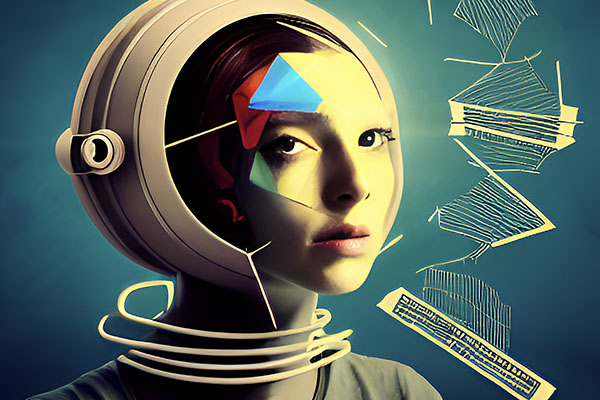A Flood of New AI Generation
The last couple of years (2020-2022) have been very interesting for content generated by artificial intelligence (AI) systems. Here in 2022, we’ve seen a multitude of new and interesting projects made available to the public for the first time.
Below are some of the AI tools that are now accessible to the public.
AI Image Generation | AI Text Generation | Other AI Tools |

Illustration generated by Stable Diffusion using the prompt: positive progress, mistakes and the lessons learned, human optimism, fine art, futuristic, retro
An Outcry of Concern
There are valid concerns from the community that illustrate real legal risks to be considered. This technology will challenge intellectual property, ownership, and specifically the rights of those who unknowingly had their years of dedication and hard work used to train someone else’s AI program.
Outside of legal concerns, these tools are bringing back the age-old question: What is art?
Who is an artist? Can computer software be creative? Can art exist without an artist?
Eric Sanner has written more about this in the “Problems for the Present” part of this blog series.
At best, this AI technology will blur the lines further. At worst, it will threaten the livelihoods of those in the creative community.
Parallels in History
Fortunately, there are many innovations from the past to draw on as we enter this renewed debate. Precedents have been set.
Not long ago the topic of Digital Rights Management (DRM) came to a head with the music industry fighting the file-sharing networks. It was a legal war. Then came the music streaming platforms and more battles were fought.
Or you could go back decades earlier when the topic of sampling was shaking the music industry. This is now a common practice with copyright more closely being managed by creators.
You can look back further into history and see how artists reacted to the invention of photography, how musicians felt about the invention of the radio, or the performing arts responded to the movies and TV.
None of these came out of the gate unscathed. It seems to always be messy at first, highly litigious for a while, and then it settles out in what most people consider to be forward progress. It takes time to figure out, but there is no doubt that these advancements change their industries and the world.
Just remember that history has a way of repeating itself.
In 1839, Jacques Louis Mande Daguerre demonstrated his new photographic process to the French Academy. After seeing this, Paul Delaroche, a history painter, announced, “From today, painting is dead!”
In 2022, the BBC titled one of their articles on the topic of AI-generated artwork “Art is Dead Dude.” That phrase was taken from a quote by Jason Allen that he gave to the New York Times when interviewed about his recent winning entry in a Colorado art fair where he submitted a work output by Midjourney. I’m unsure if Jason Allen was aware of Paul Delaroche’s quote from 183 years earlier, but it is hauntingly familiar.
New technologies will delight our imaginations while threatening our ideas of creativity and ownership. It will fascinate many and infuriate others.
This is not the first debate of its kind…and it won’t be the last.
Conclusion
Sadly, the current state of online discourse will lean toward fanning the flames. We’ll see a lot of news organizations interviewing the wrong voices with the desire to stir the pot. We’ll see a lot of one-liners and simplistic memes aiming to “solve” the topic with one poignant quip. Or maybe, we’ll just have an AI system create memes for us.
It has been said many times, “there is nothing new under the sun.” Yet, we always find areas of innovation. With each iteration we say, “but this time is different.” There is still an echo that we can hear throughout history.
With these new tools, I think there will be many lawsuits and shocking news headlines. Some will serve jail time over it. In the end, it will likely follow a predictable path of evolution and acceptance.
In my humble opinion, experiencing human-created art in person will always be an irresistible draw for creators and consumers. The creative world will never be replaced, but it will be changed.
If you’re interested in how the future of AI generation tools could affect your business, reach out to your Perficient account manager, or use our contact page to begin a conversation.
This blog post is part of a series of articles about recently launched artificial intelligence (AI) generation tools (2020-2022). Don’t miss the full series: |

